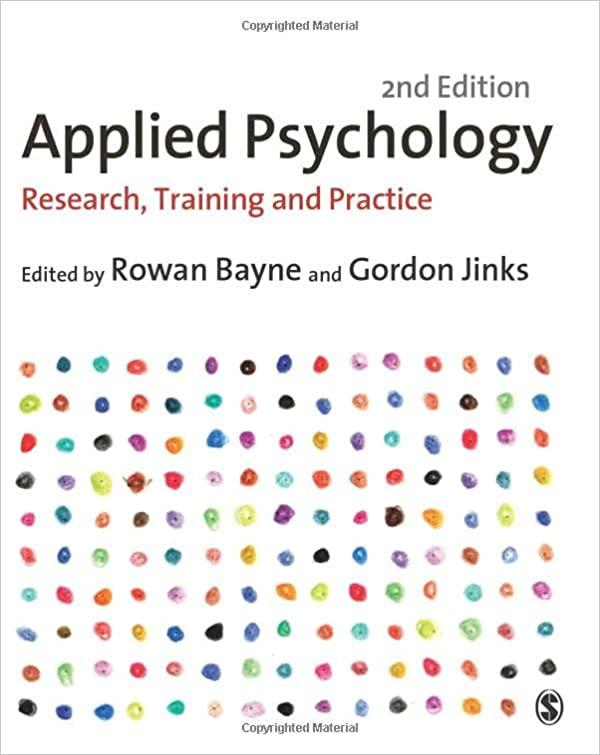Question
. please use 7th edition a p a format. Please list references used. Please use up to date/ current scholarly references/sources (within the last 5
. please use 7th edition a p a format. Please list references used. Please use up to date/ current scholarly references/sources (within the last 5 years) . cite each paragraph with facts. Please respond to Ambers post. Design a plan of care for Demica. Identify a therapy modality (reality, behavioral, REBT, cognitive). Explain why you chose this treatment and identify 2 specific evidence-based interventions that apply. Would this be in complement with medication therapy or as an alternative to medication therapy? Why?
Good morning everyone ! This week we are discussing medicating children. We have a student that was diagnosed with ADHD in kindergarten and things have been escalating. Olivia ( mom) is not sure what approach to take.I would recommend treatment with medication as part of Demica's treatment plan because despite the use of behavior therapy, there has been no improvement. Her symptoms are interfering with her daily life. According to the Centers for Disease control and Prevention ( n.d.) ( CDC), it is highly recommended that children below the age of 6 undergo behavior therapy in case of ADHD but if the response is not good, medication should be considered. With the worsening of Demica's situation, I believe medication should be considered. Medicating children with ADHD comes with the ethical issue of the side effects that are relatively uncommon. These children may experience side effects such as increased heart rate, high blood pressure, trouble sleeping, loss of appetite, and a loss of energy Robinson, Smith, Segal, n.d.). With this in mind, a mental health professional is faced with the dilemma of whether the cost of medicating these young individuals is greater than its benefits ( Robinson, Smith, Segal,n.d.). A child who is medicated is likely to have a balance in brain chemicals which causes them to be more stable and adjust well to social situations therefore eliminating the stressors that come with symptoms of ADHD. However, these individuals are young and the long term use of medication, considering that ADHD is in most cases a lifelong disease, has the potential to cause harm to their bodies. Also, once a person stops the medication, the symptoms will return. This means that a person is likely to depend on medication for the rest of their lives once a decision to medicate is made ( Robinson, Smith, Segal,n.d.). In this case; the child has been on behavior therapy since she was in kindergarten but shows signs of worsening. There is therefore a need for medication because there are no other options that would prove as effective in addressing the issue. The use of medication in children with ADHD has been proven to reduce the symptoms by between 70-80% ( Cleveland Clinic,2023). With the worsening of her symptoms, the major treatment goal should be to ensure that she functions optimally. Analyzing this case study is how I would address this dilemma.
reference
Centers for Disease Control and Prevention. (2023, September 27). Treatment of ADHD. Centers for Disease Control and Prevention. https://www.cdc.gov/ncbddd/adhd/treatment.html professional, C. C. medical. (2023).
Attention-deficit/hyperactivity disorder (ADHD). Cleveland Clinic.https://my.clevelandclinic.org/health/diseases/4784-attention-deficithyperactivity-disorder-adhdLinks to an external site.
Robinson, L. (2023, May 10). ADHD medications for children and adults . HelpGuide.org.https://www.helpguide.org/articles/add-adhd/medication-for-attention-deficit-disorder-adhd.htmLinks to an external site.
Step by Step Solution
There are 3 Steps involved in it
Step: 1

Get Instant Access to Expert-Tailored Solutions
See step-by-step solutions with expert insights and AI powered tools for academic success
Step: 2

Step: 3

Ace Your Homework with AI
Get the answers you need in no time with our AI-driven, step-by-step assistance
Get Started


